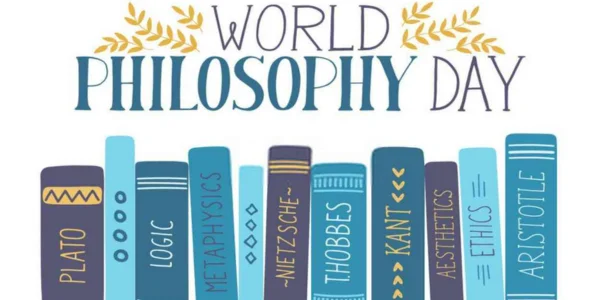World Philosophy Day, celebrated annually on the third Thursday of November, is a global observance established by the United Nations Educational, Scientific and Cultural Organization (UNESCO) to emphasize the enduring importance of philosophy in promoting critical thinking, fostering dialogue, and addressing global challenges. The day serves as a reminder of the role philosophy plays in questioning assumptions, broadening perspectives, and encouraging the pursuit of wisdom.
Here’s everything you need to know about the history, significance, and global observance of World Philosophy Day, along with its impact on fostering a culture of dialogue and understanding.
History and Origins

World Philosophy Day was first introduced by UNESCO in 2002 and formally institutionalized in 2005. UNESCO’s decision to establish this observance stemmed from a recognition of philosophy’s unique ability to cultivate critical reflection, shape values, and influence public policy. By dedicating a day to philosophy, UNESCO aims to make philosophical discourse more accessible to people around the world and encourage greater appreciation for its relevance in modern life.
The observance is not only a celebration of philosophical thought but also a platform to highlight its role in addressing societal and cultural challenges.
What is Philosophy?
Philosophy, often referred to as the “love of wisdom,” is a discipline that seeks to understand fundamental truths about existence, knowledge, morality, reason, and human relationships. It involves questioning, analyzing, and seeking clarity on life’s most profound questions:
- What is the meaning of life?
- What constitutes a just society?
- How can we differentiate between right and wrong?
Philosophy is more than an academic exercise; it is a practical tool for navigating complex issues and fostering understanding across diverse perspectives.
Significance of World Philosophy Day
The celebration of World Philosophy Day highlights several key aspects of philosophy’s importance:
- Encouraging Critical Thinking: Philosophy fosters the ability to analyze ideas, question assumptions, and reason logically, which are essential skills in an increasingly complex world.
- Promoting Dialogue and Understanding: It provides a platform for meaningful discussions across cultures, helping bridge divides and foster mutual respect.
- Addressing Global Challenges: Philosophical inquiry informs ethical decision-making, particularly in areas like technology, climate change, and social justice.
- Empowering Individuals: By encouraging reflection on fundamental questions, philosophy helps individuals find meaning and purpose in their lives.
Themes of World Philosophy Day
Each year, World Philosophy Day adopts a theme that reflects pressing global issues and highlights philosophy’s relevance in addressing them. Recent themes have included:
- 2022: “The Human of the Future,” exploring philosophical questions about humanity’s role and responsibilities in the face of rapid technological and social change.
- 2021: “Philosophy for Critical Thinking and Democracy,” focusing on philosophy’s role in promoting informed and active citizenship.
These themes underline the adaptability of philosophical thought to contemporary challenges.
How World Philosophy Day is Observed
World Philosophy Day is celebrated through a variety of activities and events that aim to engage both academic and non-academic audiences:
- Public Lectures and Debates: Philosophers, scholars, and thinkers share insights on philosophical questions and their application to modern issues.
- Workshops and Seminars: Educational institutions organize sessions to encourage critical thinking and philosophical inquiry among students.
- Cultural Events: Film screenings, art exhibitions, and theater performances explore philosophical themes in creative ways.
- Community Dialogues: Grassroots initiatives bring together diverse groups to discuss topics such as ethics, justice, and human rights.
These activities aim to make philosophy accessible to people from all walks of life and encourage active participation in philosophical discourse.
Philosophy’s Role in Contemporary Society
In an era marked by rapid technological advancement, globalization, and social change, philosophy remains deeply relevant:
- Ethics of Technology: As artificial intelligence, biotechnology, and data surveillance reshape society, philosophical inquiry helps address questions of privacy, autonomy, and human dignity.
- Climate Ethics: Philosophy contributes to discussions about environmental responsibility, intergenerational justice, and the moral implications of climate change.
- Social Justice: By examining concepts of equality, freedom, and human rights, philosophy informs efforts to combat discrimination and promote inclusivity.
- Global Peace: Philosophy fosters cross-cultural dialogue and mutual understanding, helping to resolve conflicts and promote peace.
The Philosophy of Everyday Life
Philosophy is not confined to academic institutions or intellectual debates; it permeates everyday life. From making ethical decisions to questioning societal norms, philosophical thinking shapes how individuals interact with the world. For example:
- Ethical Choices: Philosophy encourages individuals to consider the consequences of their actions and make decisions aligned with their values.
- Personal Growth: Reflecting on philosophical questions helps individuals find purpose and build resilience.
- Interpersonal Relationships: Philosophy fosters empathy and understanding, enabling more meaningful connections with others.
How You Can Participate
World Philosophy Day is an opportunity for everyone to engage with philosophical ideas and reflect on their significance. Here’s how you can participate:
- Join Local Events: Attend lectures, discussions, or workshops in your community.
- Explore Philosophy: Read philosophical works or listen to podcasts that address questions of interest to you.
- Start a Dialogue: Organize discussions with friends or family on topics like ethics, justice, or personal values.
- Share Insights: Use social media to share quotes, reflections, or questions that inspire meaningful conversations.
Looking Ahead: Philosophy for the Future
As the world faces unprecedented challenges, the role of philosophy in shaping a more equitable and sustainable future is more important than ever. Whether addressing ethical dilemmas in technology or fostering global understanding, philosophy offers valuable tools for navigating complexity and uncertainty.
UNESCO emphasizes the need to integrate philosophical thinking into education systems, policymaking, and public discourse, ensuring that future generations are equipped to tackle the issues of their time.
Conclusion
World Philosophy Day is a celebration of humanity’s intellectual and ethical pursuit of wisdom. It reminds us that philosophy is not just an academic discipline but a way of thinking that empowers individuals, enriches societies, and addresses global challenges. As we commemorate this day, let us embrace philosophy’s transformative power to foster dialogue, challenge assumptions, and build a more thoughtful, just, and compassionate world. Together, we can ensure that philosophical inquiry continues to illuminate our path forward.

